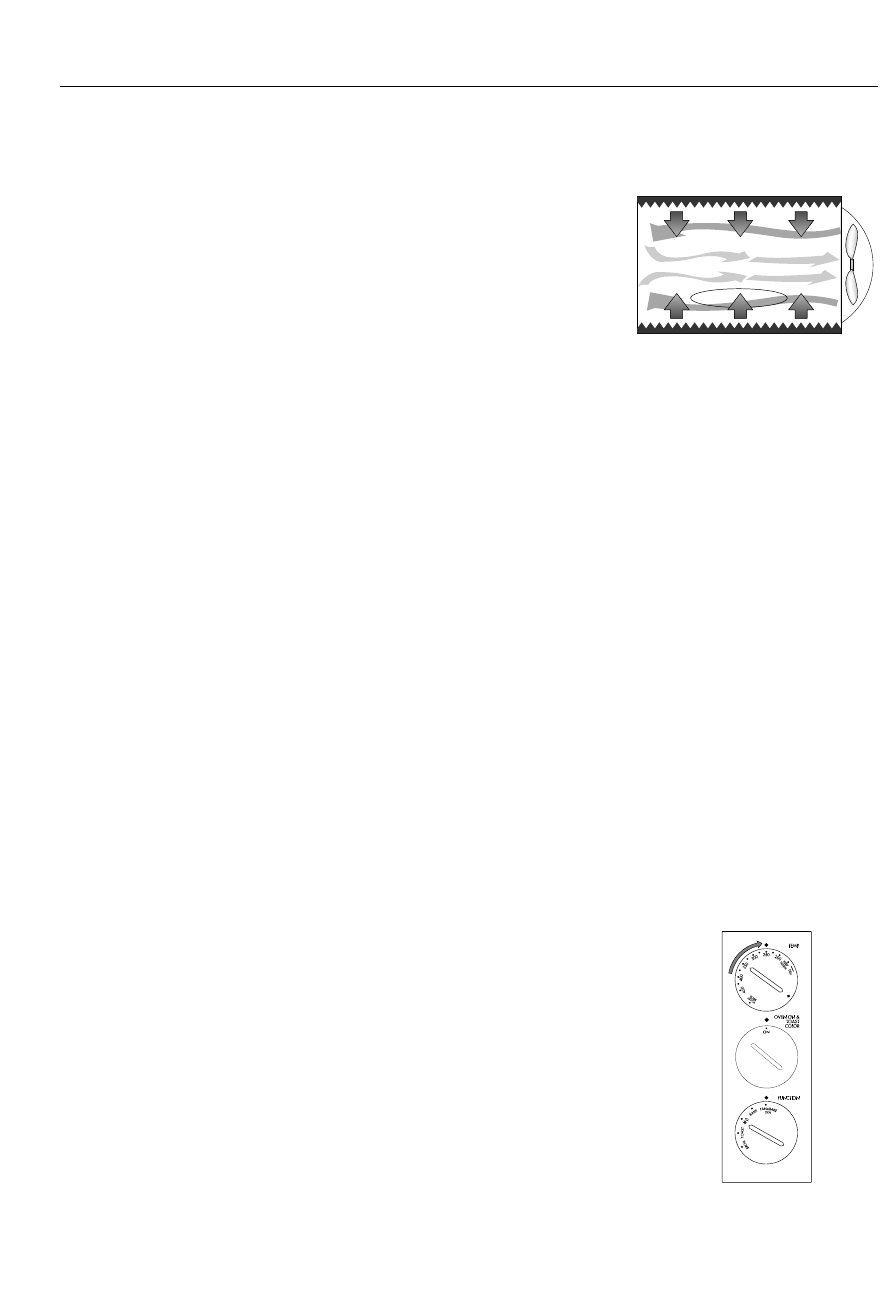
CONVECTION AND TRADITIONAL COOKING
GENERAL GUIDELINES
With convection cooking, a fan gently circulates the heated air within the oven, providing a more even
temperature around the food. This system, used in many large commercial ovens for years, produces more
even browning and cooking of baked foods, meats and poultry. The forced air also displaces the layer of
cold air surrounding the food, allowing faster cooking in many cases or a
lowering of temperature. In general, meats and poultry can be cooked in
less time (a meat thermometer will help to prevent overcooking). Cakes,
pies, cookies, etc. can be baked at a lower temperature (see charts and
recipes).
Traditional cooking is used when browning and crisping are less
important or undesirable. Use it, following conventional recipes, for
casseroles, stuffed vegetables, fish, lasagna, fruit tarts, cheesecakes and other moist mixtures.
CONVECTION BAKING OF CONVENIENCE FOODS
Many convenience foods can be successfully baked or heated by convection on the FAN/BAKE setting.
In general, follow the package directions for temperature and time. However, lower the
temperature by 25°F. for more even cooking of larger items, frozen foods (except waffles and
pancakes) and packaged casserole mixtures.
There is such a wide choice of convenience foods on the market and variations in packaging, quantities and initial
temperatures (frozen, refrigerated and shelf temperature) that it’s best to follow the package instructions. Check the
food 5 to 10 minutes before the time is up; you may need to adjust the time and/or temperature for best results.
Here are some tips for different types of convenience foods:
- If directions call for placing the food container on a metal pan or cookie sheet to avoid spills or to
aid even cooking, use the shallow pan provided. Use it or the cookie sheets provided for foods, such
as rolls, cookies, turnovers or frozen French fries, breaded fish or chicken pieces, that are placed
directly on a pan or cookie sheet.
- Some frozen foods come in “oven-proof” plastic or paper containers which can be cooked in a
microwave oven and, within limits, a conventional oven. Be sure to follow directions for maximum
baking temperature. The container can melt or scorch if too high a temperature is used. To be on the
safe side, set the oven 25°F. lower than the recommended temperature.
- When baking packaged mixtures (such as scalloped potatoes, macaroni and cheese, brownies, corn
bread, coffeecake and cake mixes) check the package directions for recommended sizes of pan,
casserole or dish and the proper baking times for each. A 9-inch round or an 11- by 7 - by 11/2 inch
rectangular pan will fit in the oven with room on all sides for air circulation.
Layer cake mixes can be baked one layer at a time in a 8- or 9-inch round pan or all of the batter in a
3-inch deep 9-inch round bundt or spring-form pan.
Tips for convection baking and roasting
To bake:
- Turn thermostat dial (D) to the desired oven temperature
- Turn the ON/OFF and toast programming dial (E) clockwise to position
ON
- Turn the function selector dial (F) to FAN/BAKE/DEH for convection cooking
and to BAKE for traditional cooking.
-
When the cooking is finished, turn the thermostat dial (D) to the
“●” position and the ON/OFF dial (E) to “OFF” position.
7

















